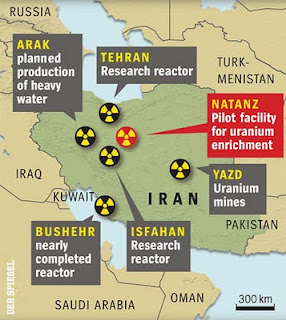Iran’s embargo target - Revolution, war or impeding A-bomb?

New sanctions imposed by the U.S. and the European Union will significantly damage the Iranian weakened economy, which has seen 50 percent-drop in national currency value over the past 12 months, especially during the last month, but still no changes is observed in Iran's nuclear ambitions, which is the final target of paralyzing sanctions.
Iran with a population of 77.5 million people, just 3.2 percent of GDP growth, based on International Monetary Fund's stats, and $4.525 GDP per capita (i.e. 2.3 times less than neighboring Turkey with similar population or even 6, 6.7 and 7.5 times respectively less than European more critical economies such as Greece, Spain and Italy which are Iran's major oil buyers in the West), is suffering heavy consequences of his nuclear ambitions and so-called "intractable behavior" by the West countries.
Iran's oil production has fallen from 4,072.6 mbpd in 2006 to 3,531 mbpd in December 2011, i.e. dropping 541,000 barrels per day. Oil export provides 80 percent of Iranian government's revenues and USD demands. Now, both the U.S. and EU embargoed Central Bank of Iran, the only custodian for the demands of country's USD market. EU embargoed Iranian oil imports on 23 January 2012, and it will become effective from 1 July 2012. Then Iran should seek other customers for its 450,000 barrels of oil after few months, but no more through USD or euro.
India as Tehran's second biggest oil buyer has not solved Iranian oil payment method worth $9.5 billion annually and proposed to pay its debts through the Indian rupee, which has fallen 8.9 percent during last 12 months. Iran and India are seeking a part of payment through stronger currency, Japanese yen, but without any result yet. China, as Iranian biggest oil buyer has also decreased Iranian crude import by 220,000 bbpd in January. Japan and South Korea, Iran's other major oil buyers are also seeking and negotiating to reduce Iranian oil import. With regarding these stories, Iran with $58.5 billion legal import (alongside $20 billion illegal import) faces USD shortage. Dollar rate in Iran has doubled and Bahar-e-Azadi Gold Coin, minted by Central Bank of Iran, has tripled in price in Iran during last 12 months, i.e. Iranians' cash reserves in national currency have almost halved in value.
Head of Parliament's Research Center Ahmad Tavakoli warned on Thursday that the existing situation in the gold and currency market will lead to the bankruptcy of the national economy.
However, Iranian authorities' behavior in nuclear issue has become even tenser even rather.
Iranian nuclear weapon
In 2009 Iran owned about 1,900 kg of 3.5 percent-enriched uranium, now this figure is 5,000 kg, alongside 80 kg of 20 percent-enriched uranium. Therefore, sanctions on Iran were extended to impede its nuclear program, especially enriching uranium as sensitive part of raw supplies for nuclear warheads have been failure.
British Defense Secretary Philip Hammond during a speech at US think tank the Atlantic Council on Jan. 5 said that he assumed Iran was working "flat out" to produce a nuclear weapon. A charge that has been claimed by the U.S and Israel repeatedly, but Iran rejected.
Sanctions targets mass unrests
Could Iran halt enriching uranium because of economic pressures? I think no, because enriching uranium does not need tens of billions USD necessarily.
The economic bankruptcy in Iran may lead to uprising, a scenario that Russian Foreign Minister Sergey Lavrov strongly suspected that, saying "new Western sanctions against Iran are aimed at "strangling" the economy and possibly inciting popular unrest."
However, the house-arrested head of Iranian major opposition, "Green Movement", Mir Hossein Mousavi is also strong supporter of Iran's nuclear program, especially enriching uranium. He condemned President Mahmoud Ahmadinejad when Iran and the West were negotiating to bring out 1,200 kg 3.5%-enriched uranium from Iran in 2009 instead of supplying the nuclear fuel for Tehran Nuclear Research Plant.
Impeding Israel to attack Iran or preparing to war?
Iran's fatal enemy, Israel, which has been threatened "wiped off the map'" by Tehran, places inside the range of Iranian ballistic missiles. Many media reports urged about Israel's probable attack on Iran's nuclear facilities. Tel-Aviv has attacked Iraq's Osiraq and Syria's al-Kibar nuclear facilities before. The tightened sanctions over Iran may make Israel hope that sanctions would affect Iran's behavior. However, Iran who has observed Iraq and Libya's fate after their withdrawal from nuclear program and compares them with isolated, but stabled North Korea, which owns nuclear weapon, may become determined to continue its nuclear program, at least to the point to be technically prepared to manufacture nuclear weapon immediately whenever it decides, like Brazil, Japan, South Korea and etc.
Iran announced last month that its some nuclear facilities have been replaced to Fordo enrichment site inside the heat of mountains to protect them from probable attacks in future.
However, attacking on Iran's outspread nuclear facilities may result in suspension of Iran's program for few years, not more.
The UK, the U.S. and France delivered a pointed signal to Iran, sending six warships led by a 100,000 ton aircraft carrier through the highly sensitive waters of the Strait of Hormuz last week.
The reason is announced as Iran's threat to close this strait which 20 percent of the world's oil is passing through there, but with regarding Iran's 2.2 mbpd oil that is pass from Hormuz, closing this vital route for Iran by itself isn't seem believable.
Embargo on Iranian oil and the Central Bank would weaken its economy seriously, exactly the similar case happened in Iraq before the United State's invasion over it in 2003. As long as Iran continues nuclear program as its "national pride", being witness for another war in the Middle East is never unlikely.
Comments
Post a Comment